Get Back on Their Feet
When the Ride Goes Wrong: Legal Help for Bikers
If you’ve been involved in a motorcycle accident, finding the right biker accident legal services is crucial to protecting your rights and securing fair compensation. In this article, Sonny Badger of Support Bikers, our motorcycle partner, will explain some of what to expect after a motorcycle accident and how to best move forward. Here’s what you need to know immediately:
Quick Guide to Motorcycle Accident Legal Services:
- Call 911 and seek medical care immediately, even for seemingly minor injuries
- Document everything – take photos, gather witness information, and get the police report
- Don’t speak to insurance companies before consulting with a lawyer
- Contact a specialized motorcycle accident attorney who understands biker culture and rights
- Work with lawyers on contingency – most charge no upfront fees
The freedom of the open road comes with risks that every rider understands. When accidents happen, the consequences can be devastating – physically, emotionally, and financially. Motorcycle accidents often result in severe injuries, with riders facing a 98% chance of injury in multi-vehicle crashes according to industry data.
Insurance companies frequently employ tactics to minimize payouts to injured riders, including exploiting common motorcycle practices to shift blame. This is why specialized legal representation is essential. A lawyer who understands motorcycle culture can make the difference between a denied claim and substantial compensation.
Unlike car accidents, motorcycle crashes require unique legal approaches due to bias against riders, severe injury patterns, and complex liability issues. Many attorneys advertise motorcycle accident services, but few truly understand the riding experience or the specific challenges bikers face in the legal system.
I’m Sonny Da Badger, a lifelong rider who has experienced the challenges of navigating biker accident legal services after crashes on the road. Having ridden everything from dirt bikes to Harleys, I understand the unique legal challenges riders face when accidents happen.
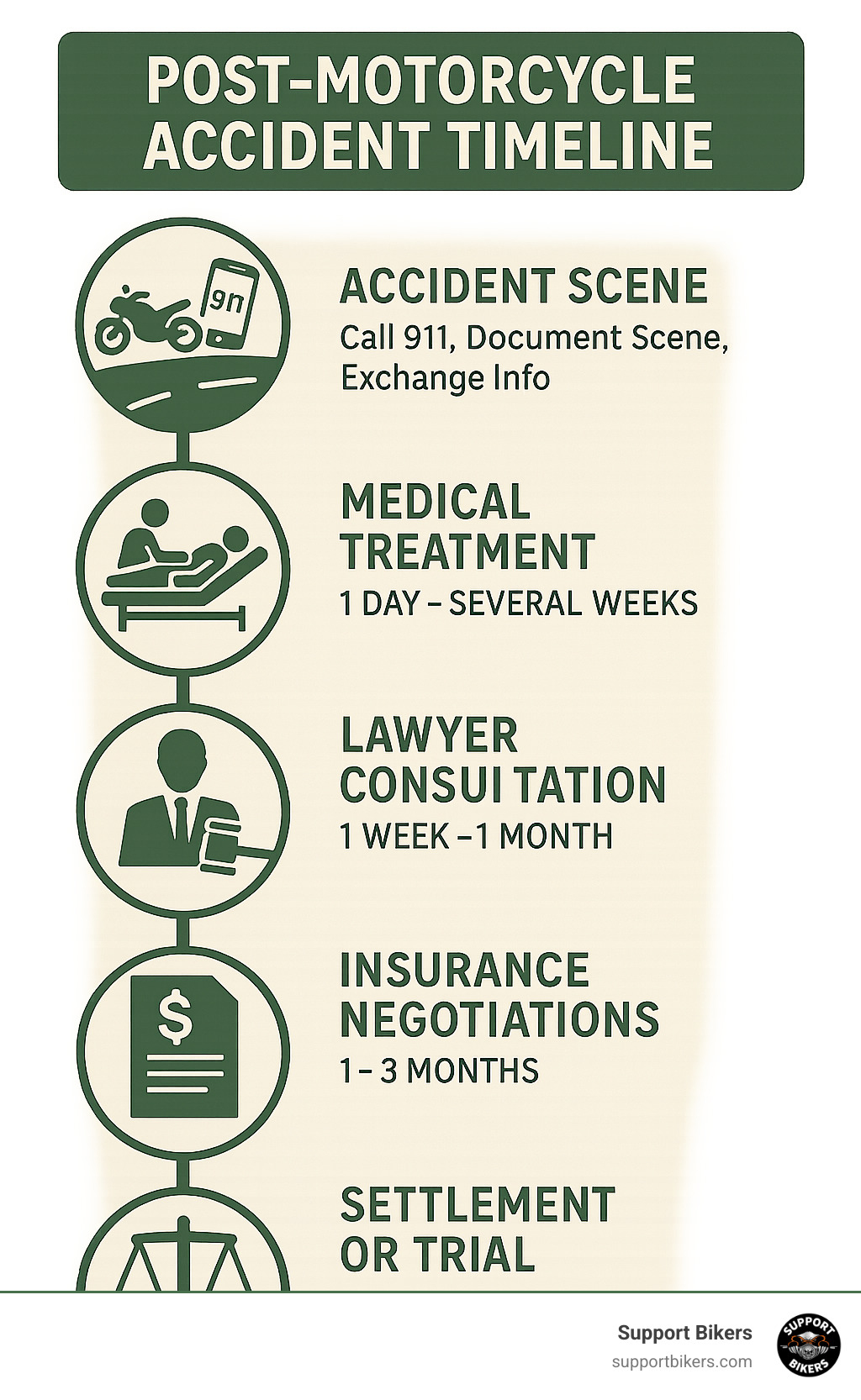
The First 60 Minutes After a Motorcycle Crash
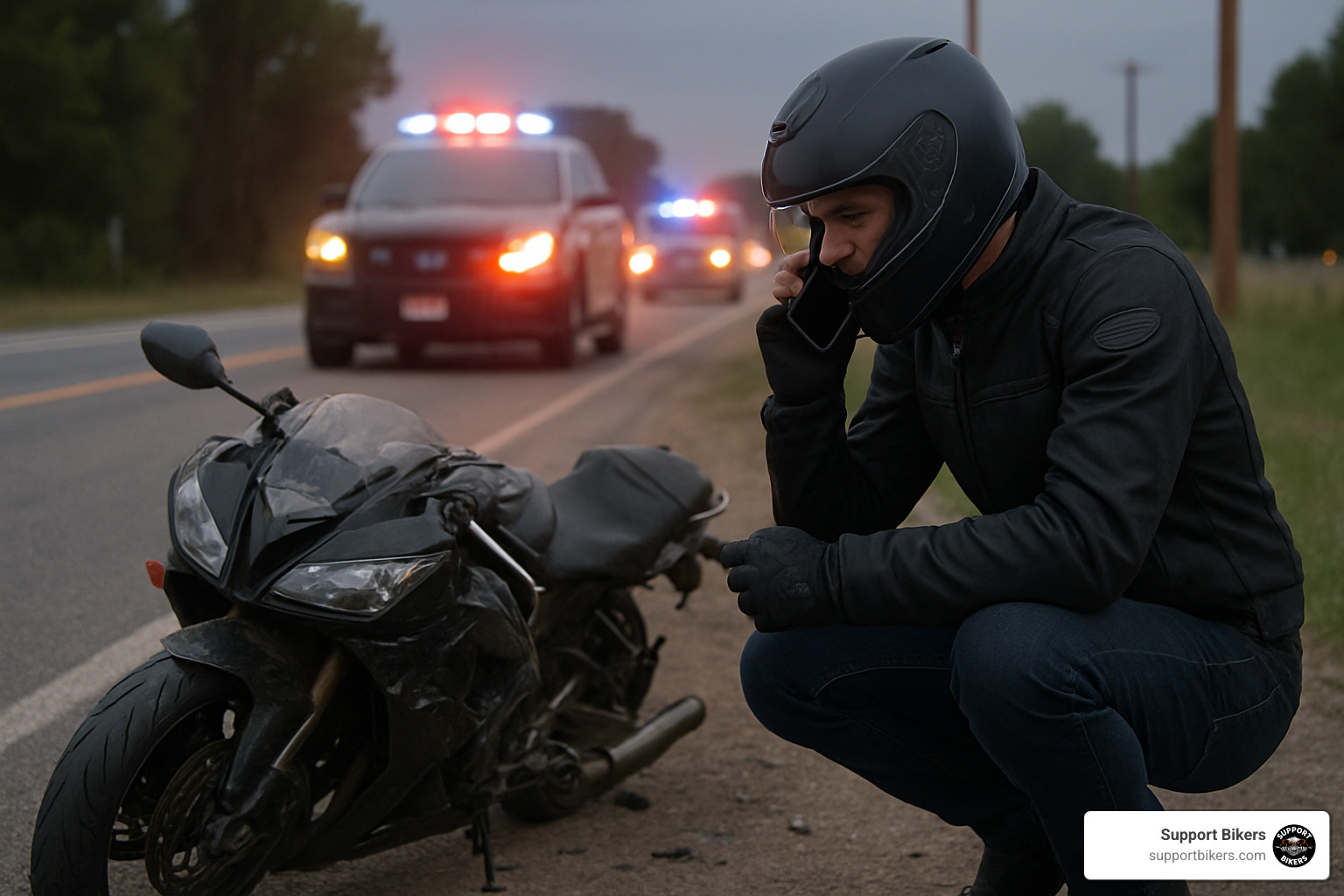
The clock starts ticking the moment metal hits pavement. Those first 60 minutes after a motorcycle crash aren’t just crucial—they’re often the foundation of everything that follows, from your recovery to your legal case.
When the unthinkable happens, your first move should always be to call 911. Even if you think you’ve just got a few scrapes, having police and medical professionals document the scene creates an official record that can prove invaluable later. Over 75% of motorcycle accidents involve a passenger vehicle, and establishing who was at fault starts right here, in these first moments.
If you’re able to move without risking further injury, get yourself to safety. The middle of a roadway is no place for a wounded rider, and preventing a secondary collision becomes priority number one. Once you’re secure, it’s time to gather information. Exchange names, contact details, insurance info, and license numbers with everyone involved—this isn’t being pushy, it’s being prepared.
Your smartphone becomes your most powerful tool in these moments. Document everything. Snap photos of your motorcycle from multiple angles, capture images of the other vehicles, road conditions, weather, traffic signs, and yes—your injuries. Those skid marks that might disappear with the next rainfall? They tell a story about what happened, so get them on camera.
Bystanders who witnessed the crash can become crucial allies in establishing the truth. Their unbiased accounts often cut through the confusion of who did what, so politely ask for their contact information before they disappear into the wind.
When police arrive, request an accident report and ask how to obtain a copy. This official documentation becomes a cornerstone of any future claim. What you do in these first frantic moments can dramatically impact your ability to receive fair compensation down the road.
More info about motorcycle accident services
Seek Medical Help—Even for “Minor” Road Rash
“It’s just a scrape” might be the most dangerous phrase in a biker’s vocabulary after a crash. When adrenaline floods your system, it’s an amazing painkiller—and a dangerous mask for serious injuries.
That “minor” road rash? It can develop into serious infections or require skin grafts if not properly treated. Those slight headaches? They might signal a traumatic brain injury that could affect you for years to come. The stiffness in your neck? Potential spinal damage that needs immediate attention.
Medical documentation does double duty: it ensures you get proper treatment while simultaneously creating a paper trail directly linking your injuries to the accident. This connection becomes vital when insurance companies inevitably question the source or severity of your injuries.
The invisible wounds matter too. Approximately one in four motorcyclists experience PTSD after a crash. The psychological impact of a serious accident shouldn’t be underestimated, and early intervention can make all the difference in your mental recovery.
According to Johns Hopkins Medicine, acute spinal cord injuries may not present immediate symptoms but can lead to permanent damage without proper diagnosis and treatment. Your future mobility—and possibly your life—might depend on that “unnecessary” ER visit.
Scientific research on spinal cord injuries
What NOT to Do After a Wreck
In the chaos following a crash, sometimes knowing what to avoid is just as important as knowing what to do. These missteps can seriously undermine your recovery—both physical and financial.
Never admit fault. Even a simple “I’m sorry” can be twisted into an admission of guilt. Human nature makes us want to apologize, but in the legal context of a crash scene, those words can cost you dearly.
Your social media accounts should go silent about the accident. Insurance adjusters are increasingly savvy about monitoring riders’ online presence. That innocent post about getting back on the road could be used to suggest your injuries aren’t as limiting as claimed in your case.
When the phone rings and it’s the other driver’s insurance company, let it go to voicemail. Their friendly adjusters are trained to extract statements that minimize your claim. The smartest move? Direct all communication through your biker accident legal services professional.
Quick settlement offers are rarely in your best interest. They’re designed to close your case before the full extent of your injuries becomes clear—often before you’ve even completed initial treatment.
Your damaged motorcycle and gear are more than just personal property—they’re evidence. Preserve them in their post-accident condition until your attorney advises otherwise. And finally, keep your pen in your pocket. Don’t sign anything from insurance companies without expert review, as these documents often contain language limiting your rights to fair compensation.
Medical, Injuries & Evidence: Laying the Groundwork
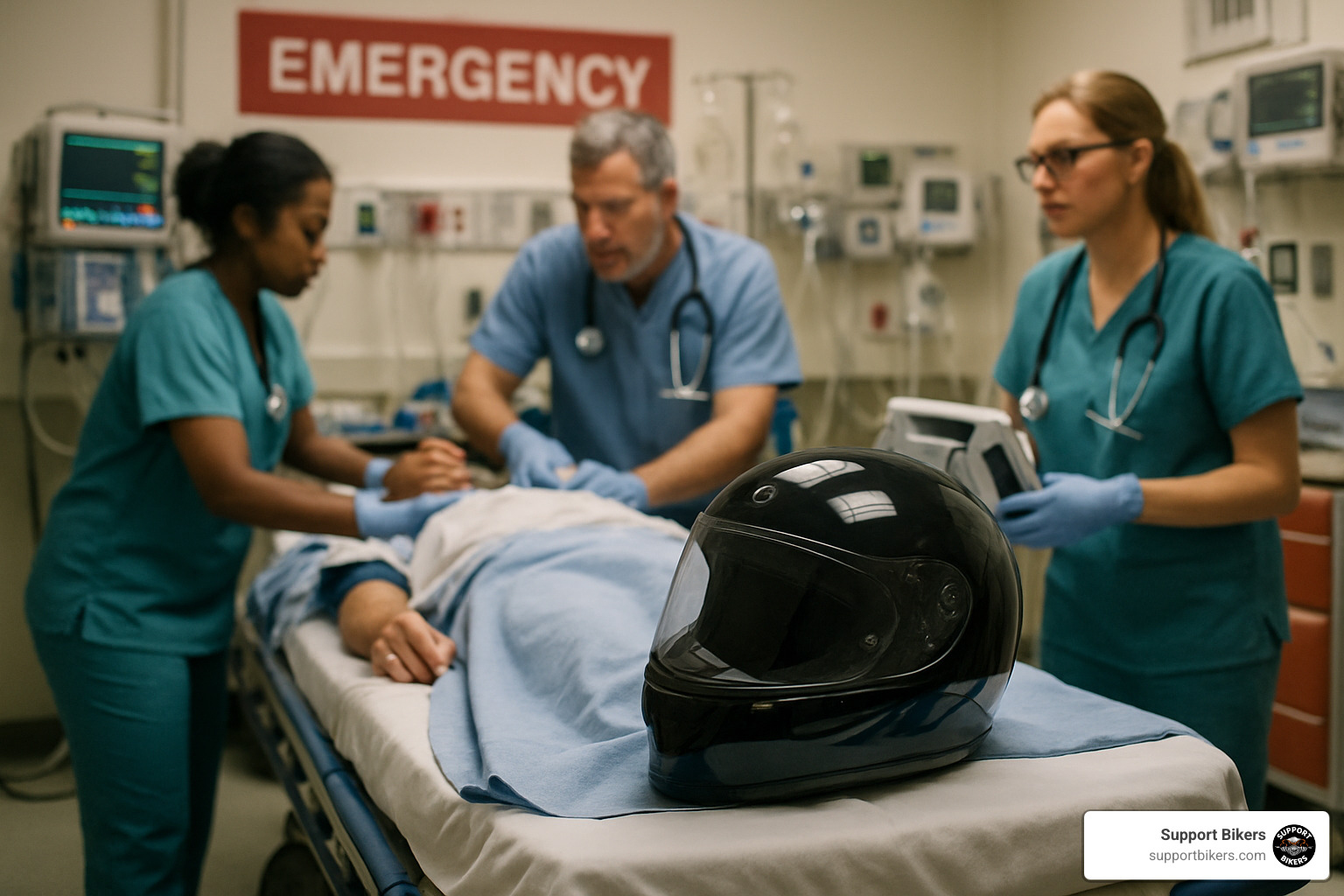
When the leather meets the pavement, your body takes the hit in ways a car driver never experiences. As riders, we’re painfully aware that motorcycle accidents typically result in more severe injuries than car crashes – it’s the price of that open-air freedom we love.
Road rash isn’t just a badge of honor – it can be life-altering. What looks like a scrape might actually require multiple surgeries, leading to permanent scarring or nerve damage that affects you for years. I’ve seen fellow riders dismiss these injuries, only to face serious infections weeks later.
Fractures come with the territory when you go down. Arms, legs, wrists, ribs – our bones bear the brunt of impact forces that would otherwise be absorbed by a car’s frame. Multiple or compound fractures often mean surgical pins, plates, and months of healing time that keep you off your bike and potentially out of work.
Traumatic Brain Injury (TBI) remains one of our greatest risks. Even with the best helmet, the brain can still suffer concussions or more severe injuries that might affect your memory, concentration, or personality. I never ride without my lid, but I also know its limitations.
Spinal damage strikes fear in every rider’s heart. Back and neck injuries ranging from herniated discs to paralysis can change your life in seconds, turning a passionate rider into someone fighting to walk again. The rehabilitation journey can be long and expensive.
Internal injuries are the silent dangers – organ damage and internal bleeding might not show immediate symptoms, but they can be deadly if not caught early. This is why getting checked out after any crash is non-negotiable.
Biker’s arm happens when we instinctively try to break our fall, resulting in nerve damage that can cause long-term weakness or numbness. It’s a uniquely motorcycle-related injury that many doctors miss if they don’t regularly treat riders.
The financial impact of these injuries is staggering. Specialized motorcycle accident firms have recovered over $1 billion in judgments and settlements for riders – a sobering reminder of just how devastating these crashes can be to both body and wallet.
| Injury Severity | Common Treatments | Recovery Timeline | Legal Considerations |
|---|---|---|---|
| Mild Road Rash | Cleaning, bandaging, antibiotic ointment | 2-4 weeks | Document all treatment, photograph healing process |
| Severe Road Rash | Surgical debridement, skin grafts, IV antibiotics | 2-6 months | Long-term scarring may qualify for additional damages |
| Mild TBI/Concussion | Rest, monitoring, cognitive therapy | 1-3 months | May require neuropsychological evaluation |
| Severe TBI | Surgery, intensive rehabilitation, long-term care | Lifelong | Future care costs must be calculated by experts |
Collect & Preserve Hard Proof
The difference between a denied claim and full compensation often comes down to evidence. After my own crash, I learned that video footage is gold – whether from your GoPro, nearby traffic cameras, or business surveillance. This unbiased eye can counter the all-too-common “I didn’t see the motorcycle” defense.
Physical evidence tells the story your words can’t. That mangled helmet, those torn leathers, and broken bike parts visually demonstrate the forces your body absorbed. Don’t rush to repair or replace anything until your attorney gives you the green light.
Medical documentation builds the foundation of your case. Keep meticulous records of everything – emergency room visits, follow-up appointments, medication costs, physical therapy sessions, and even mental health treatment for post-crash anxiety or PTSD. Every bandage change and pain pill matters.
Repair estimates for your motorcycle and gear provide concrete numbers for property damage claims. Get multiple quotes from reputable shops that understand the true value of your ride.
Lost wage verification through pay stubs, tax returns, and employer statements proves how the crash has affected your income. Self-employed riders face additional challenges here – good documentation of your business earnings before the crash is essential.
Remember to maintain what lawyers call “chain of custody” for all physical evidence. Document when and how you collected each item and how it’s been stored. This prevents defense attorneys from claiming evidence was tampered with or altered.
More info about lawsuit funding
Building a Strong Case Folder
Creating a bulletproof case requires thinking like the opposition. What would you attack if you were defending against your claim?
Expert witnesses can transform your case from “he said, she said” into scientific fact. Accident reconstruction specialists analyze skid marks and vehicle damage to determine exactly how the crash occurred. Medical experts connect your injuries directly to the accident. Motorcycle mechanics can testify about your bike’s condition before and after the crash.
Accident reconstruction often reveals crucial details missed in police reports. Many officers lack specialized training in motorcycle dynamics and may misinterpret what happened. Professional analysis establishes vehicle positions, speeds, and impact points with mathematical precision, countering bias that often works against riders.
The burden of proof in personal injury cases falls on you, the injured rider. You must demonstrate all four elements of negligence: the driver owed you a duty of care (to drive safely), they breached that duty (by texting, for example), their breach caused your accident, and you suffered damages as a result. Missing any one of these elements can sink your claim.
This burden becomes especially heavy in states with harsh contributory negligence rules. In North Carolina, for instance, if you’re found even 1% at fault, you could be barred from any recovery whatsoever. This makes building an airtight case not just important, but essential to receiving any compensation at all.
Burden of proof in showing the defendant’s negligence
Biker Accident Legal Services: From Insurance Battles to Courtrooms
When you’re recovering from a motorcycle crash, the last thing you need is a battle with insurance companies. Yet that’s exactly what happens to most riders. Biker accident legal services go far beyond simple paperwork filing—they’re your shield in what can become a complex, often unfair fight for the compensation you deserve.
Insurance companies aren’t in business to hand out fair settlements. They employ well-rehearsed tactics designed to minimize what they pay you. They’ll request recorded statements, hoping you’ll say something—anything—they can twist to reduce your claim. “How fast were you going?” they’ll ask innocently, when there’s no innocent reason for the question.
They’re masters of delay, too. By dragging claims out for months or even years, they’re betting you’ll eventually accept a lowball offer out of sheer financial desperation. Medical bills pile up, you can’t work, and suddenly that settlement that covers half your costs starts looking necessary rather than fair.
Perhaps most frustrating is how they’ll dispute your injuries. That road rash that required three debridements? “Probably not that serious.” Your broken collarbone? “Could have happened anywhere.” And the classic move—blaming you, the rider, because society’s anti-motorcycle bias runs deep in insurance adjusting rooms.
A good motorcycle attorney counters these tactics with experience and strategy. They’ll send detailed demand letters that leave no room for misinterpretation about liability and damages. When the at-fault driver is uninsured or underinsured, they’ll file UM/UIM claims to tap into additional coverage sources. They negotiate from a position of strength, backed by thorough evidence and legal precedent.
While most cases settle before trial, the best settlements often come when your attorney has clearly demonstrated they’re ready and willing to go to court. Insurance companies take represented claims far more seriously than those without legal backing.
Motorcycle Accidents Differ From Car Accidents In Many Ways
How Lawyers Level the Playing Field
The average rider doesn’t know how to search for hidden insurance policies—but your attorney does. They’ll dig deep to find every possible source of compensation, including umbrella policies, employer policies (if the driver was on the job), and even your own underinsured motorist coverage.
For serious injuries, the true cost extends far beyond your current medical bills. Specialized attorneys work with medical experts to calculate lifetime care costs, ensuring your settlement accounts for future surgeries, ongoing physical therapy, home modifications, and potential career limitations.
In cases involving drunk drivers or especially reckless behavior, biker accident legal services can pursue punitive damages—additional compensation meant to punish truly negligent behavior. These damages can substantially increase your recovery amount.
Perhaps most importantly, experienced motorcycle attorneys understand the prejudice riders face in the legal system. They know how to counter the “dangerous biker” stereotype with facts, evidence, and compelling narratives that show you as the responsible rider you are.
Studies consistently show that represented claimants receive settlements 3-4 times larger than those who go it alone—meaning you still come out significantly ahead even after paying your lawyer.
Contingency Fees Explained—Pay Only if You Win (Biker Accident Legal Services)
“But I can’t afford a lawyer right now.” I hear this all the time from injured riders, and I always tell them the same thing: You don’t need to afford one. That’s the beauty of contingency fees.
Biker accident legal services operate on a “no win, no fee” basis. You pay nothing upfront to hire an attorney. The firm advances all the costs—investigation expenses, expert witness fees, court filing charges—throughout your case. Your attorney only gets paid if they recover money for you, taking a percentage of the final settlement or verdict.
The American Bar Association provides guidelines for reasonable contingency fees, and your fee agreement should spell out exactly what you’re agreeing to. Look for clear explanations of:
- The precise percentage your attorney will receive
- How case expenses will be handled and reimbursed
- Whether the percentage comes from the gross settlement (before expenses) or net (after)
- Any circumstances that might alter the fee structure
This arrangement creates perfect alignment between you and your attorney—they only win when you win, and the more you recover, the better they do. It gives you access to high-quality legal representation regardless of your financial situation, which is exactly what you need when going up against insurance companies with unlimited resources.
Dollars, Deadlines & Negligence Rules
The road to fair compensation after a motorcycle crash is filled with legal twists and turns that every rider should understand. Knowing these rules isn’t just helpful—it could be the difference between receiving the compensation you deserve or walking away with nothing.
Statute of Limitations is essentially your legal countdown clock. Most states give you two to three years from your accident date to file a lawsuit, but this varies widely. I’ve seen too many fellow riders learn this lesson the hard way.
The negligence rules in your state dramatically impact your case’s outcome. These rules fall into three main systems:
Under comparative negligence, your compensation gets reduced by your percentage of fault. If you’re found 20% responsible for the accident, you’ll receive 80% of the awarded damages—a fair approach many states follow.
With modified comparative negligence, you can recover damages only if you’re less than 50% (or 51% in some states) responsible. Cross that threshold, and you may receive nothing.
The harshest system is contributory negligence, used in states like North Carolina, Alabama, Virginia, and Maryland. Under this rule, being found even 1% at fault can completely bar you from recovery—making experienced legal representation absolutely crucial.
When it comes to the compensation itself, you’ll encounter different types of damages:
Economic damages cover tangible losses like medical bills, lost wages, property damage, and future care costs. These are typically straightforward to calculate with proper documentation.
Non-economic damages address the human cost of your accident—pain and suffering, emotional distress, and loss of enjoyment of life. These damages acknowledge that your suffering goes beyond what medical bills can show.
Punitive damages may be awarded in cases where the at-fault party’s behavior was particularly reckless or intentional, like drunk driving. These additional damages serve to punish egregious conduct.
If you’re hit by an uninsured driver or experience a hit-and-run, your own policy’s Uninsured/Underinsured Motorist (UM/UIM) coverage becomes your lifeline. These claims often involve complex subrogation processes where your insurer pays your claim and then pursues the at-fault party for reimbursement.
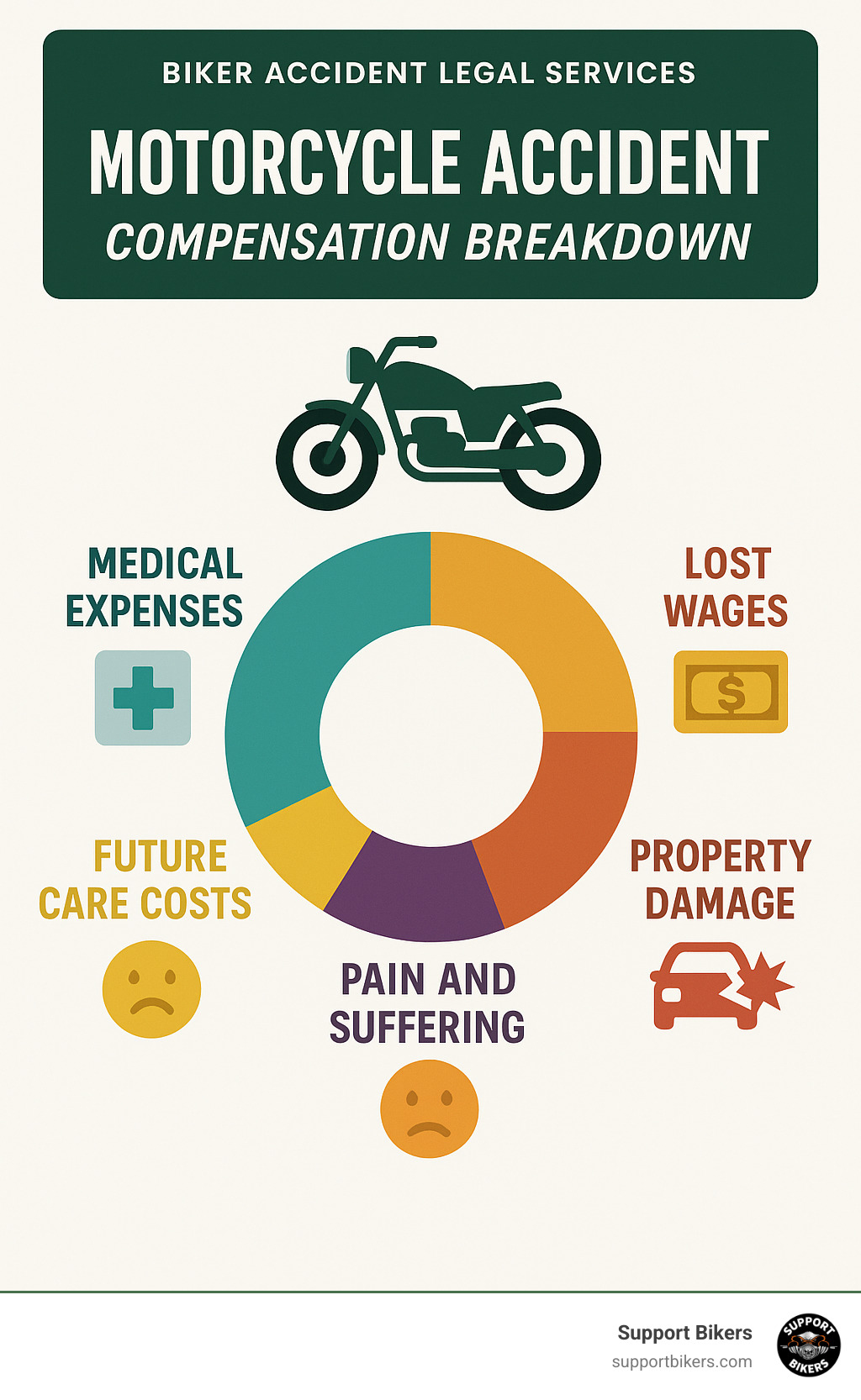
State-Specific Traps: Contributory Negligence Bars Recovery
Some states have particularly harsh rules that can devastate your chances of recovery after a motorcycle accident. Being aware of these potential pitfalls could save your claim.
The 1% Rule in contributory negligence states like North Carolina is especially brutal for riders. If you’re found even 1% at fault—perhaps you were going 5 mph over the speed limit when someone cut you off—you could be completely barred from recovering any compensation. This single rule makes having skilled biker accident legal services not just helpful but essential in these jurisdictions.
Lane-splitting considerations vary dramatically by state. While California explicitly permits this practice, in other states it’s either illegal or legally ambiguous. If you were lane-splitting during your accident, it could significantly impact liability depending on your state’s specific laws. An attorney familiar with local motorcycle statutes can help steer these waters.
The impact of helmet laws can also affect your compensation. If you weren’t wearing a helmet in a state with mandatory helmet laws, insurance companies may argue your injuries were worsened by this choice. They might try to reduce your compensation even if the accident wasn’t your fault at all. This defense tactic is particularly common with head injury claims.
These state-specific rules highlight why local legal expertise matters so much. A motorcycle accident attorney who rides themselves and knows your state’s particular laws can help you avoid these potential claim-killers and maximize your chances of fair compensation.
The team at O’Connor Law is ready to begin tackling your legal problem today. Email or call our toll free number at (800) 518-4LAW for a free initial consultation and review of your case.
https://www.oconnorlaw.com/practice-areas/motorcycle-accidents
Choosing Your Road Captain—Finding the Right Lawyer
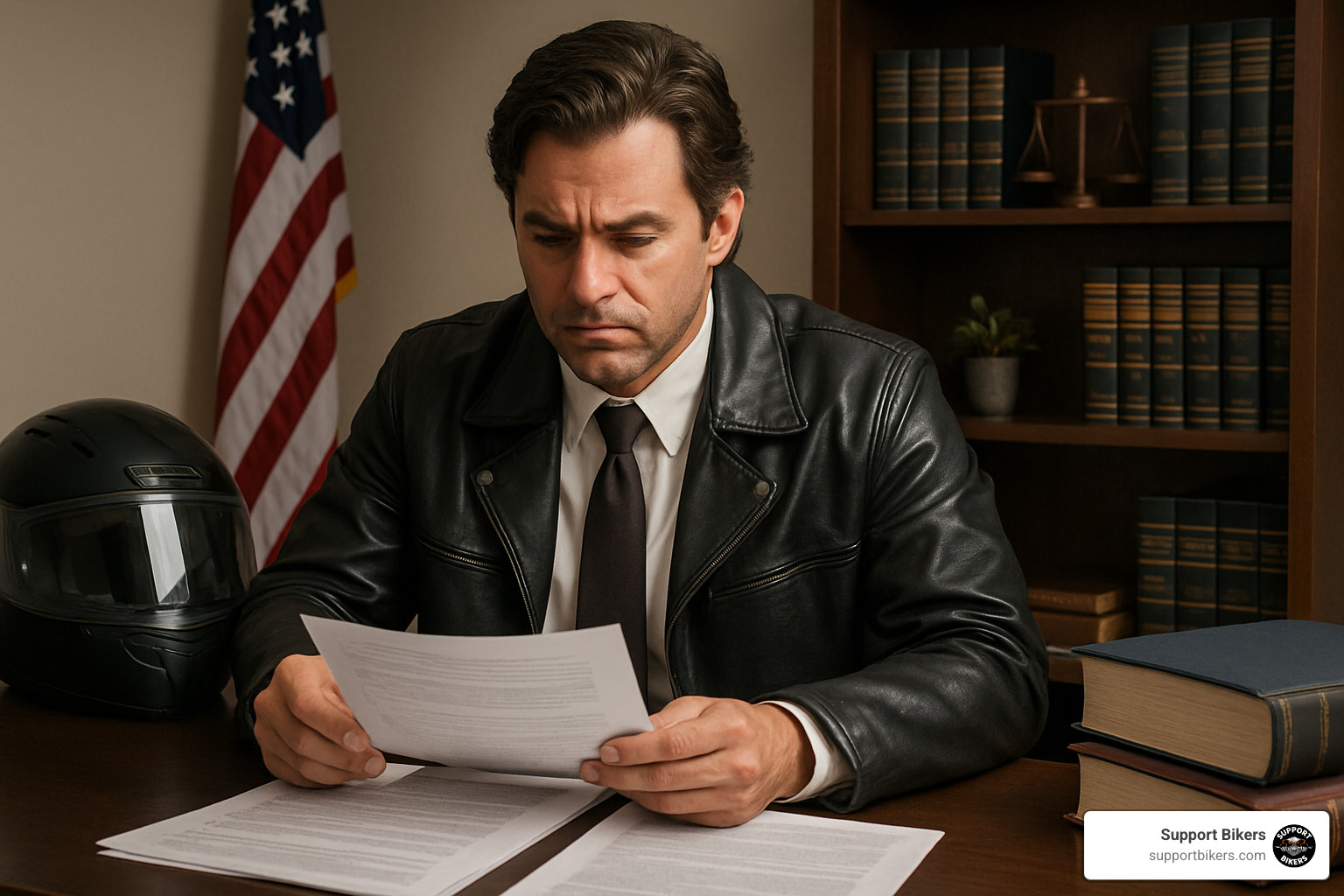
When you’re down after a crash, the attorney you choose becomes your road captain through the legal journey ahead. This isn’t just another decision—it might be the most important one you’ll make on your path to recovery.
Your attorney’s track record matters tremendously. Don’t be shy about asking direct questions: “How many motorcycle cases have you personally handled? What were the outcomes? Have you taken motorcycle cases to trial?” Past performance isn’t a guarantee, but it’s the best predictor you have.
The legal landscape changes from county to county, which is why local knowledge gives your attorney a significant edge. They’ll know which judges might harbor anti-motorcycle bias, which expert witnesses are respected in local courts, and the nuances of regional traffic laws that could make or break your case.
Pay attention to communication style during your initial consultation. Does the attorney explain complex concepts clearly? Do they listen more than they talk? You’ll be working together for months, possibly years—you deserve someone who keeps you informed and treats you with respect throughout the process.
Finally, nothing speaks louder than the experiences of previous clients. Request client references, particularly from riders who had similar cases. A good attorney will have no shortage of satisfied clients willing to share their stories.
At Support Bikers, we’ve built connections with attorneys nationwide who understand rider culture and have proven their worth in motorcycle cases. Finding the right road captain makes all the difference when navigating the challenging terrain of motorcycle accident claims.
Vetting Checklist & Red Flags (Biker Accident Legal Services)
When evaluating potential biker accident legal services, think of it like testing a used bike before buying—you need to know what to look for and what spells trouble.
The best attorneys offer a free initial consultation without pressure. They work exclusively on contingency, meaning if you don’t get paid, neither do they. Quality representation often comes from firms that maintain smaller caseloads, giving each client the attention they deserve. You want direct access to your attorney, not just paralegals running interference.
Be wary of any lawyer who guarantees specific dollar amounts—the legal system doesn’t work that way.
Look for evidence they take cases to trial when necessary. While most cases settle, insurance companies offer better settlements when they know your attorney isn’t afraid of the courtroom. Ask specifically about their trial experience with motorcycle cases.
Above all, trust your gut. You need an advocate who respects you, understands motorcycle culture, and genuinely cares about your recovery—both physical and financial. The Support Bikers directory can connect you with attorneys who’ve proven themselves as true allies to the riding community, ensuring you don’t face this challenging road alone.
Frequently Asked Questions About Motorcycle Accident Claims
When Should I Call a Lawyer?
The short answer? As soon as you safely can after your crash. Ideally, make that call within the first 24-48 hours while everything is still fresh.
I’ve seen too many riders wait until they’re drowning in medical bills or getting the runaround from insurance adjusters before reaching out for legal help. By then, skid marks have washed away, witnesses have disappeared, and you might have already said things to insurance companies that undermine your case.
Early legal help means your attorney can immediately start preserving critical evidence, interviewing witnesses while their memories are clear, and guiding your medical documentation from day one. They’ll also run interference with those insurance adjusters who are trained to get you to say things that hurt your claim.
Most motorcycle accident attorneys offer free initial consultations, so there’s literally nothing to lose by making that call right away. Your future self will thank you.
How Long Will My Claim Take To Settle?
“How long until I see money?” is probably the second question most riders ask me, right after “How much will I get?” The honest answer is: it depends on your specific situation.
Simple cases with clear liability might wrap up in 3-6 months, while more complex situations can stretch to a year or beyond. If your case goes to trial, you’re looking at potentially 1-2 years before resolution.
Several factors influence your timeline:
Your injuries matter – Serious injuries require more treatment and documentation. Most attorneys will advise waiting until you reach maximum medical improvement (MMI) before settling, so the full extent of your injuries is clear.
Disputed liability slows things down – When the other side argues about who caused the crash, your attorney needs time to gather evidence and possibly bring in accident reconstruction experts.
Insurance company cooperation varies wildly – Some adjusters are reasonable; others seem to delay as a business strategy.
Court backlogs affect trial dates – If settlement negotiations fail, court schedules can add months to your timeline.
According to data from motorcycle attorneys, most cases settle during or shortly after findy, typically around 120 days after filing a lawsuit. But remember, a good attorney won’t rush your case just to get it done—proper preparation leads to better compensation.
Can I Recover if the Driver Had No Insurance?
Yes, you absolutely can—though it gets more complicated. When I was hit by an uninsured driver years ago, I initially thought I was out of luck, but there were several avenues for recovery.
Your first resource is your own Uninsured/Underinsured Motorist (UM/UIM) coverage on your motorcycle policy. This coverage exists specifically for these situations, and in states like North Carolina, it’s mandatory for a good reason. Your attorney will essentially file a claim against your own insurance company, which then steps into the shoes of the at-fault driver’s missing insurance.
If the at-fault driver has significant personal assets, your attorney might pursue those resources directly—though honestly, most uninsured drivers don’t have deep pockets.
Sometimes third parties share responsibility for your crash. This might include vehicle manufacturers (if defects contributed), government entities (if poor road design played a role), or even bars (if they over-served the driver who hit you).
Some states also maintain special funds to help victims of uninsured drivers, though these typically have strict eligibility requirements and caps on recovery.
The key takeaway? Don’t assume you’re out of options just because the driver who hit you was uninsured. A good motorcycle accident attorney can identify all potential sources of compensation beyond the obvious ones.
If you’ve been injured in a motorcycle crash and need help navigating these complex issues, consider applying to our Wrecked Rider Fund for assistance.
Conclusion
When the freedom of the open road is suddenly interrupted by the harsh reality of an accident, navigating the aftermath can feel overwhelming. That’s why understanding biker accident legal services isn’t just helpful—it’s essential for your recovery journey.
The path forward after a motorcycle crash isn’t something you should travel alone. Throughout this guide, we’ve covered the crucial steps that can make all the difference in your physical, emotional, and financial recovery.
Remember to document everything immediately after an accident—those photos, witness statements, and police reports become your strongest allies. And don’t wait to seek medical attention, even if you think you’ve just got some road rash. Hidden injuries have a way of revealing themselves days later, often when it’s harder to connect them to your accident.
Choosing the right legal representation is perhaps your most important decision. Look for attorneys who actually understand motorcycle culture. They’ll recognize the unique challenges riders face in the legal system, including the unfortunate bias that often works against us.
State laws vary dramatically when it comes to motorcycle accidents. From strict contributory negligence rules that can bar recovery if you’re found even 1% at fault, to different helmet laws that might affect your claim—local knowledge matters tremendously.
At Support Bikers, we believe in the strength of our community. That’s why we’ve built a network of attorneys who truly understand riders’ needs and the specific challenges of motorcycle accident cases. These aren’t just lawyers who advertise to bikers—they’re professionals who speak our language and fight for our rights.
The difference between having specialized representation and going it alone can be dramatic—often determining whether you receive fair compensation for your medical bills, lost wages, bike repairs, and pain and suffering, or end up with a denied claim and mounting bills.
If you’ve been injured in a motorcycle accident, don’t hesitate to reach out for proper legal guidance. And if you’re in a position to help fellow riders in need, please consider supporting our Wrecked Rider Fund, which provides direct assistance to injured motorcyclists facing financial hardship during their recovery.
Ride safe, know your rights, and remember—when the unexpected happens, the right support system can help you get back where you belong: on the road.










